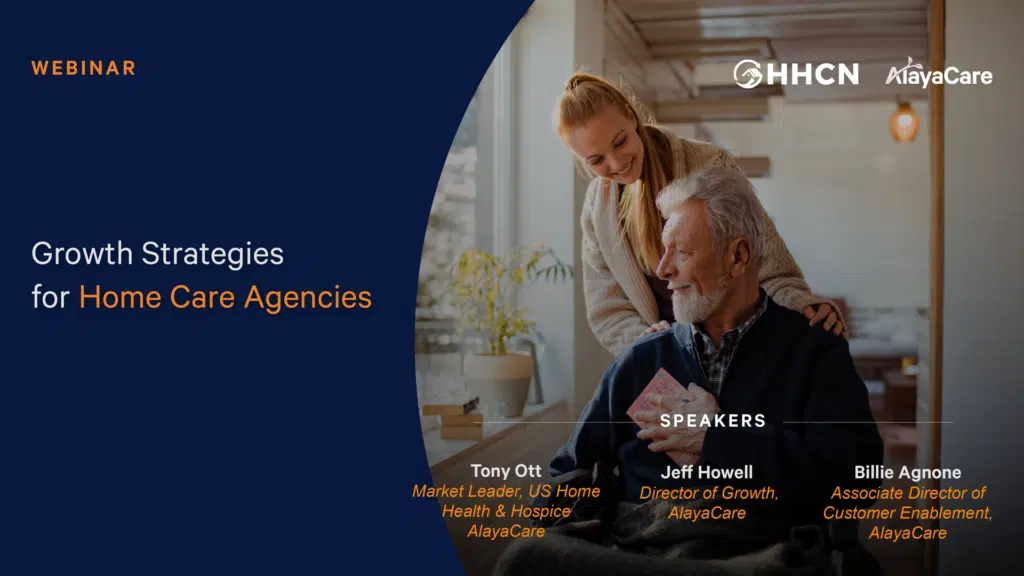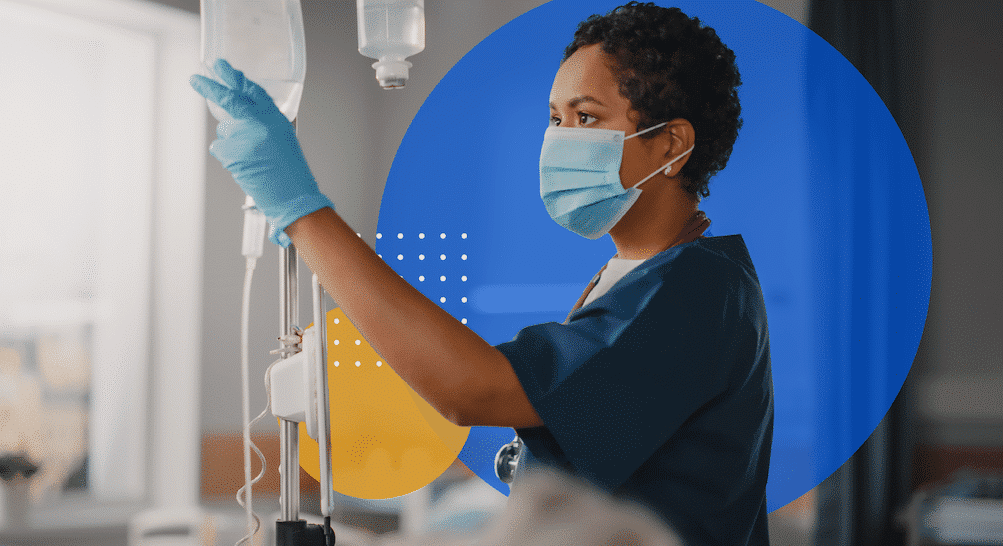Blog
The key to better client experience? Improving communication between home-based care providers and clients

Balancing both operational efficiency and delivering exceptional client experience is a constant objective for which home-based care agencies strive.
The idea of a one-size-fits-all approach in home-based care is disappearing, as every client has specific and unique needs and preferences that require personalized attention. A client-centered care approach encourages active collaboration and shared decision-making between clients and their circle of care.
But how can agencies provide more client-centered care to boost client experience and increase operational efficiencies?
Answer: Improve communication and transparency between providers and clients.
The role of communication and transparency in client-centered care
A fundamental element of client-centered care is communication and transparency between providers and clients. Communication is vital in home-based care. It’s not just about sharing information; it’s the key to ensuring clients and their families are well-informed and involved in decisions.
For instance, a study on decision-making by older adults in home-based care found that the most frequently reported barriers to decision-making were a lack of information about options and confusion due to information overload.
However, communication isn’t just between the client and the caregiver. It includes everyone involved in the client’s circle of care. Involving this support network ensures everyone is on the same page and can contribute to the care plan.
Agencies can partner with clients, their families, and caregivers by prioritizing communication and transparency. This partnership leads to better outcomes and a more supportive care environment.
In short, good communication isn’t just a tool—it’s the foundation of successful home-based care.
Top communication challenges faced by home-based care agencies
Many home-based care agencies face communication and transparency challenges when dealing with their clients. Some of these challenges include:
- High call volumes and extended wait times create an administrative burden and frustrate clients.
- No access to information in a centralized area leads to dissatisfaction and complications in coordinating care.
- Privacy concerns regarding client data underscore the need for HIPAA-compliant practices.
- There is a lack of access to schedules and the ability to request visit updates, which leads to frustrated clients and communication breakdowns around avoidable scheduling conflicts.
- Lack of cost transparency and billing information creates barriers for clients to stay on track of their payments and understand costs.
- The difficulty for clients and families accessing critical care information directly impacts client engagement in their care and, ultimately, their outcomes.
How do we deliver excellent client communication and transparency?
Leveraging technology can help home-based care organizations improve communication and collaboration with clients. By employing appropriate digital tools, agencies can ensure that all parties are consistently updated about care plans, health status changes, and other relevant information, promoting a more collaborative care environment.
Consider utilizing client portals.
Client portals, such as AlayaCare’s Family Portal, are online portals that offer secure, two-way asynchronous information exchange. They allow clients and authorized family members to rate their care team, process payments, and access their health care information anywhere and anytime. This helps them become active and empowered members of their care plans, making it easier to make quick decisions and coordinate in delivering client care.
“Through secure client portals such as AlayaCare’s Family Portal, family members can seamlessly participate in the care process, fostering a collaborative environment that further enhances the effectiveness of care delivery.”
Adrian Schauer, CEO of AlayaCare, Top 5 predictions for home-based care in 2024.
Enhance agency efficiency and client satisfaction with AlayaCare’s Family Portal
Agencies can increase operational efficiencies, and clients can access their care information and needs securely and conveniently through a centralized portal.
With AlayaCare’s Family Portal, agencies benefit from:
1. Improved communication between agency and client
Reduce wait times with a two-way asynchronous information exchange within the Family Portal between the agency and client/circle of care. This will allow both parties to communicate without making phone calls or waiting on hold. This improved communication establishes trust and rapport between providers and clients. This trust is essential for fostering a positive therapeutic relationship and promoting client engagement in their care.
2. Enhanced client transparency with essential care information and billing
Clients should have access to their upcoming visits on a calendar and the ability to make changes quickly without going through multiple steps. The Family Portal makes care plans and necessary information easily accessible. This includes all information from past visits, documents, and other essential details.
“Scheduled visits are what we’ve observed as the number one piece of information clients and their care circle we’re looking for regularly. So, granting them access to these schedules and their care information in a centralized portal is core to enhancing their care experience and feeling more engaged with their care plans. With Family Portal, providers can be better equipped to overcome potential miscommunications. And perceived lack of communication.”
Yiou Huang, Senior Product Marketing Manager at AlayaCare, Enhanced Family Portal: The Family Portal Experience at Nucleus Independent Living Live Platform Tour.
Additionally, billing and invoices should be available directly in the portal, allowing clients to see the costs of care services and pay directly within the portal. This feature can provide greater transparency and ease of use for clients.
“Because of my […] disability, it’s important that I know who’s coming, and now I know,” said a Family Portal user through an in-app client survey.
3. Better client health outcomes
Clear and accurate communication helps prevent medical errors and ensures client safety. With Family Portal, providers can minimize the chances of adverse events by conveying information about medications, care plans, progress notes, and potential risks.
“The key benefits of a centralized portal for clients are increased convenience and secure access for clients and the care circle. For home-based care agencies, operational efficiencies are essential. These benefits can lead to better outcomes through improved preventive and follow-up care quality by bringing all this information to the tip of your clients’ fingers.”
Yiou Huang, Senior Product Marketing Manager at AlayaCare, Enhanced Family Portal: The Family Portal Experience at Nucleus Independent Living Webinar.
4. Shared decision-making with clients and their families
Effective communication empowers clients to participate actively in their care decisions. Home-based care providers can facilitate shared decision-making and enhance client satisfaction by providing comprehensive information, discussing care plan options, and considering clients’ preferences within the portal.
Key Considerations from Nucleus Independent Living
Leveraging technology to its fullest potential can be transformative. While platforms like AlayaCare’s Family Portal offer immense value, it’s essential to recognize that their effectiveness hinges on more than just activation. As Nucleus Independent Living exemplified during The Family Portal Experience at Nucleus Independent Living Webinar, simply having access to a Family Portal isn’t enough; it requires a strategic approach to maximize its benefits.
During the webinar, Karin Archer Myles and Bushra Kundi from Nucleus Independent Living emphasized that the Family Portal is more than a passive tool—it’s a strategic vehicle for communication and client empowerment. By focusing on a guided onboarding experience, Nucleus ensures clients fully understand how to activate their accounts and how to use the platform from the outset. By leveraging their Care Team Leads and their existing client relationship, Nucleus lays the groundwork for continuous meaningful engagement and collaboration between clients and caregivers.
Ultimately, the key takeaway is clear: technology has the potential to revolutionize client-centered care. However, its value lies in implementing a well-thought-out activation strategy prioritizing effective communication and empowerment. By adopting this approach, providers can unlock the full potential of technology such as AlayaCare’s Family Portal to enhance the care experience for their clients.


